I have to hand it to David Benioff and D.B. Weiss, the showrunners of Game of Thrones.
After a frequently frustrating last two seasons of the show, they finally gave us what we kept saying we wanted all along… and it turns out it wasn’t what we wanted at all.
In “The Bells,” the penultimate episode of the series, we finally get to see the long-awaited showdown between Cersei and Daenerys, between the current queen and the “rightful” one, between “evil” and “good.” But instead of an epic and heroic battle, Weiss and Benioff give us the opposite: the brutal reality of war, the crushing misery of power, the hopeless obliteration of ideals, and a reminder that “be careful what you wish for because you just might get it” is one of life’s truest wisdoms.
Here’s why the destruction of King’s Landing in “The Bells” is so harrowing and so well-aligned with Game of Thrones‘s core themes — but, also, why it still doesn’t entirely work as a piece of storytelling.
WARNING: SPOILERS AHEAD for the second-to-last episode of Game of Thrones.
Fire and Blood
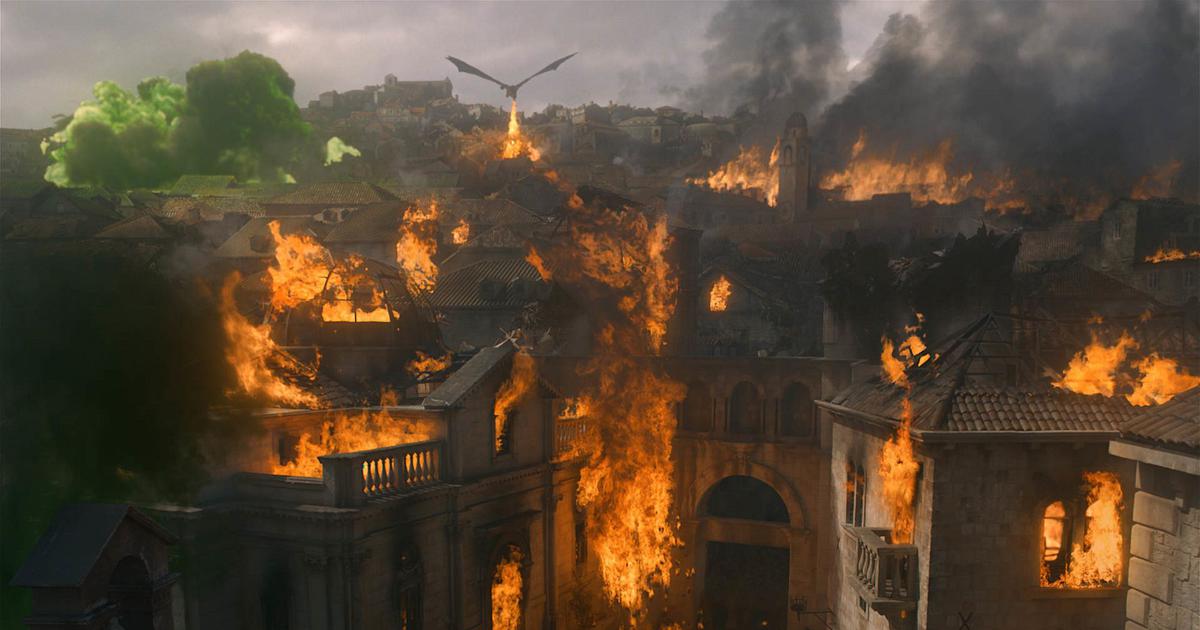
There’s a reason why Game of Thrones author George R. R. Martin took a break from finishing the actual A Song of Ice and Fire novel series that the HBO adaptation is based on and instead gave fans Fire & Blood, a novel that tells the story of all the other times a Targaryen has tried to rule a continent by using dragons: it never ends well, for anyone.
Maybe he thought that part was missing from the HBO adaptation?
Maybe he thought Weiss and Benioff were forcing Daenerys Targaryen to “break bad” faster in these last two seasons than he intends to justify in the (still-unfinished) books, so he wanted to provide the necessary cultural context?
Whatever the case, “The Bells” visualizes the downside of using WMDs to win a war: in the end, the people who pay the biggest price aren’t the soldiers but the innocents caught in-between.
In a way, “The Bells” also plays like a counterpoint to the Battle of Winterfell in “The Long Night,” which many fans — myself included — thought was disappointing and unsatisfying. We wanted more destruction, more death, more misery, not necessarily because we’re ghouls but because the world of Westeros has trained us to expect these things from its narrative, and from its worldview.
Instead, Weiss and Benioff simply saved all that destruction and pointless carnage for the show’s definitive showdown. Except, when you have a dragon, it’s never really a showdown, because it’s never really a fair fight, is it?
The most horrifying thing to realize about “The Bells” is that Dany razed King’s Landing with only one dragon. Imagine what would have happened if Viserion and Rhaegal had survived to torch the city alongside Drogon. All the fire, blood, destruction and death we witnessed would have tripled.
Some viewers might have preferred that, because they think Game of Thrones is really about the arbitrary nature of violence, or about humankind’s inability to rise above its worst instincts, or about the ugly necessities of obtaining and holding power. All of which, in a way, is true.
But Game of Thrones is about something else, too.
Why “The Bells” Works Thematically
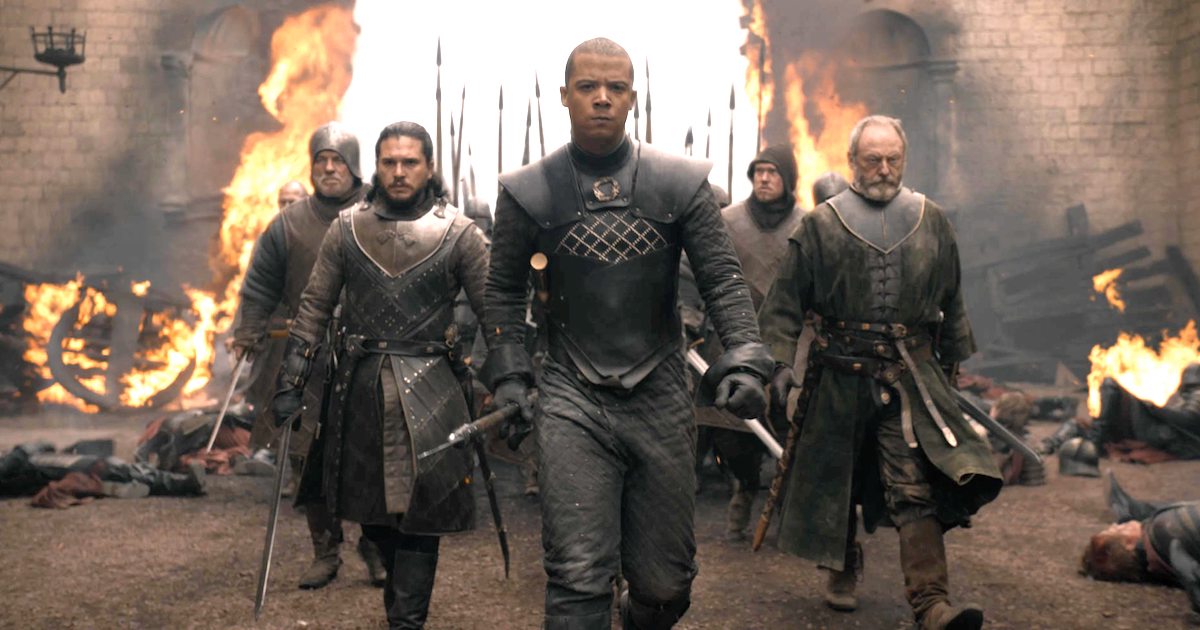
For several seasons now, longtime fans have been complaining that actions on Game of Thrones have lacked consequences.
But this season, the inevitiablity of consequences has finally returned with a vengeance.
Fans may dispute whether Dany’s heel turn toward becoming the “mad queen” was earned, and we can debate that narrative choice in a moment. But from a thematic perspective, this was absolutely necessary to convey the show’s two deepest themes: our internal struggle to define ourselves by our actions as opposed to our heredity or the expectations of others, and the terrifying simplicity of the fact that “power is power” — and this power, as Varys reminds us, resides where men say it does.
It’s worth remembering that every main character on Game of Thrones represents an ideal or a concept, which must be perpetually tested in conflict with other ideals and concepts.
Since Jon Snow represents the nobility of honesty — in other words, the archetypal “hero” profile — the story must define him by testing that ideal at every turn and exposing the flaws in its rigidity. First nobility and honesty gets his father Ned killed and sets the entirety of the show’s plot into motion. It also unjustly banishes Jon to The Wall, where he’s repeatedly forced to choose between duty and humanity. When Jon does finally become a leader and a general — titles he never actually wanted — he’s perpetually undermined by his own inability to lie strategically even when it might be in his people’s best interests. The only two times he falls in love, he’s forced to choose between that love and his own sense of moral duty — and he ends up losing both in the end.
Meanwhile, Dany is defined by the price of ambition. She believes the throne is rightfully hers, and she overcomes unimaginably huge challenges in order to become a queen and amass the army that will enable her to achieve her dream, her goal, and her destiny: winning the Iron Throne.
There’s just one catch: along the way, she’ll lose everyone she loves or cares about.
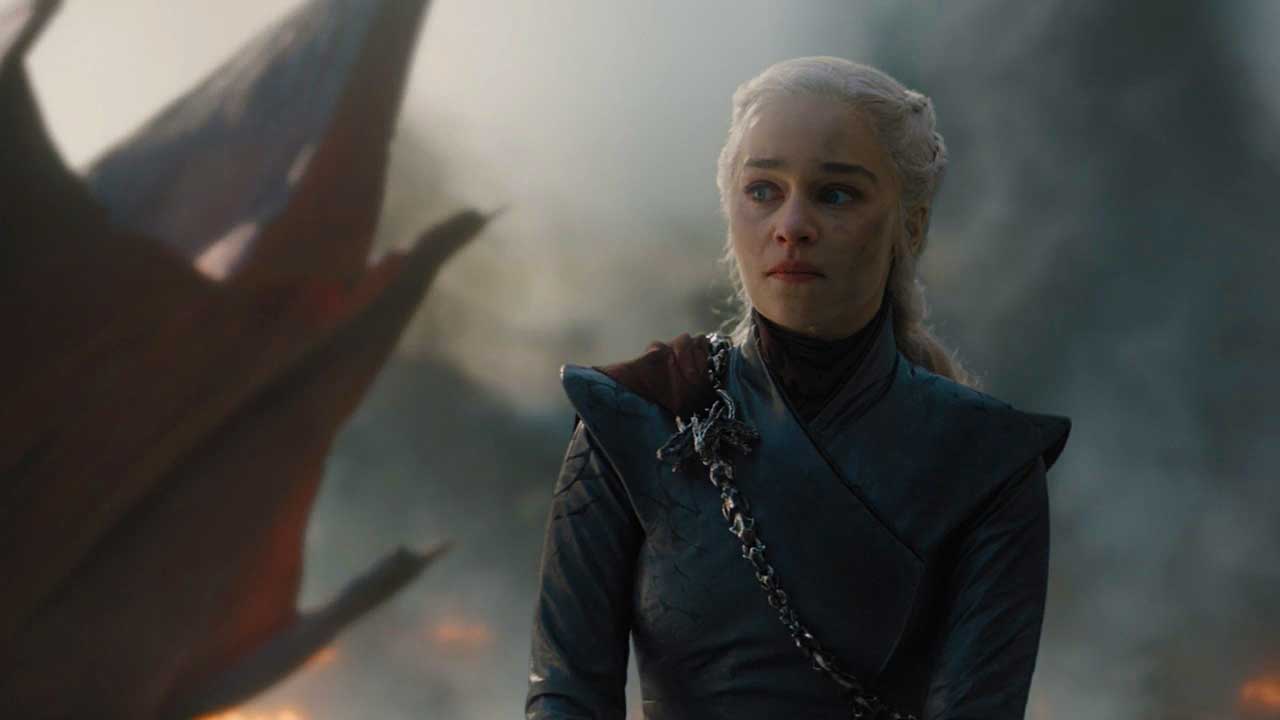
Dany and Jon are two sides of the same coin. They can never have what they want AND what they think they deserve — not because Game of Thrones refuses to allow its characters to have happy endings, but because Game of Thrones doesn’t seem to believe that you can stand for two things at once.
Jon can’t be honorable without losing love. He needs to choose. He chooses honor.
Dany can’t be victorious and beloved. She needs to choose. She chooses victory, regardless of what it costs her.
And in a perfect summary of consequences, Dany destroys King’s Landing because of Jon.
If Dany hadn’t believed Jon about the threat of the White Walkers — and if she hadn’t fallen in love with him — she wouldn’t have lost Viserion during the campaign to rescue Jon from the wights (which is the only thing that enables the Night King to destroy the Wall and advance into the North — sure, ‘winter is coming,” but it only arrives because of this choice). She also wouldn’t have lost Jorah’s moral guidance when he died defending her at the Battle of Winterfell, and she wouldn’t have lost Missandei in the ambush at Dragonstone.
Character-wise, Jon betrayed Dany by staying true to his own moral code and sharing his true heritage with Arya and Sansa… who told Tyrion… who told Varys. Dany’s resulting act of “justice,” and her feelings of isloation and persecution, rob her of her last remaining allies.
In other words, Jon’s sense of honor literally got nearly everyone Dany cares about killed.
So when Grey Worm’s bitterness over Missandei’s execution causes him to snap and he starts killing unarmed Lannister guards who’d just surrendered, which inspires Jon’s own northmen to go on a rape-and-pillage spree of their own… that moral failure of his people is also the long tail consequence of Jon’s own actions.
In Westeros — and maybe in life — truth and honor are not always pure and blameless.
Is this a nihilistic worldview? Is it overly simplistic? Is it unfair? Does the series’s turn toward widespread destruction and irredeemable actions render the show’s finer nuances meaningless, or its larger mythology pointless in the face of men and women simply behaving terribly whenever they have the power to do so?
Maybe this is a better question:
If every ideal is in opposition with every other ideal, and if there can only be one that survives, which ideal should it be? Honor? Love? Justice? Self-actualization? Or power as asbolute? And what price are we willing to watch the characters pay — or to pay ourselves, as viewers, as co-conspirators — in order to see that ideal succeed?
In that sense, “The Bells” succeeds by subverting our own desires. By depicting wave afer wave of senseless, hopeless, inescapable destruction in the name of “victory,” it forces viewers to look at what we always seem to be demanding from the show and asking, “Is this really who we want to be?”
And yet…
Why “The Bells” Doesn’t (Entirely) Work Narratively
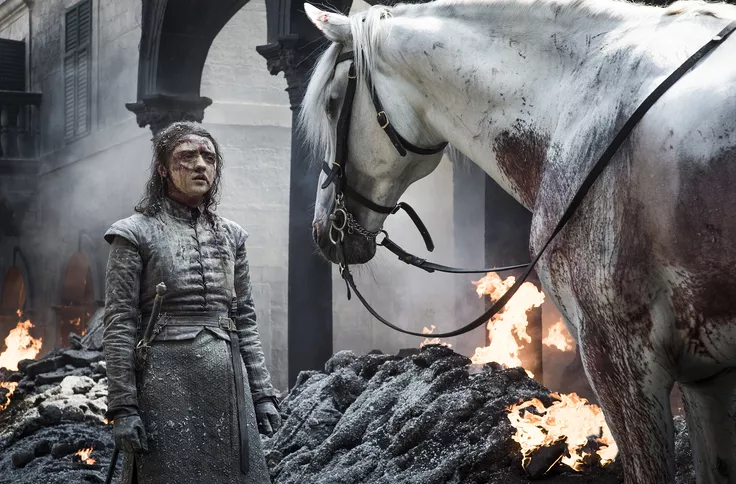
Game of Thrones Seasons 7 and 8 have been… uneven.
They’ve often felt rushed, and disconnected from their source material. If it seems like Benioff and Weiss are using shorthand to connect all the dots and force characters into situations that pay off both the plotlines and the themes… well, it’s true.
As The Ringer‘s Alison Herman points out:
Seasons 3 and 4 stretched a single book of Martin’s writing into 20 hours’ worth of television; seasons 7 and 8 squash two novels’ worth of events into just 13. The showrunners have indicated this choice was theirs and not their network’s.
This is how we end up with ludicrous plot twists like Euron Greyjoy’s fleet ambushing Dany’s combined forces and killing Rhaegal with three quick crossbow shots in episode 4… and then Drogon annihilating the entire Greyjoy fleet and the entirety of King’s Landing, including dozens of scorpion crossbows, all by himself, in episode 5.
The whole purpose of the ambush sequence was to set up Missandei’s death at Cersei’s hands, which — combined with the death of Rhaegal — pushed Dany over the edge into full dracarys, “burn them all” mode. Was it earned? It might have been if the show had an extra ten episodes to justify Dany’s descent into feeling isolated, but right now… no, not really.
Instead, when she laments to Jon that she has no love in Westeros, we as the viewers can’t help but shout “you haven’t even tried!” at our screens. And it’s not really Dany’s fault that she hasn’t tried; she just hasn’t had the time.
So when the show goes out of its way to have Tyrion remind us over and over that “if the bells ring, it means Cersei has surrendered,” it has the effect of a horror film. We wait, hoping against hope that Cersei will actually do the right thing, the humane thing… and when those bells finally do ring, we think we’ve averted a catastrophe… only to see Daenerys suddenly seem to decide, on a whim, to burn the whole city to the ground after all.
To be clear: the books and (to a lesser degree) the show have been nudging Dany in this direction for years, or at least strongly implying that a “Mad Queen” turn was possible. So my real frustration is not that her choice is entirely unfounded, or even that a character we like and empathize with has decided to do something unthinkable.
It’s that Dany’s choice to burn the innocent citizens of King’s Landing is a genocidal war crime, which is the exact opposite of what her character has always seemed to stand for.
Worse, it doesn’t even happen strategically. Dany and her forces had already won the battle. The bells had rung. The city had surrendered. Dany didn’t need to destroy anything else — she chose to, not because her character demanded it, but because the plot required it.
Her deveastating action works plot-wise because it forces Jon (and likely Tyrion and Arya) into a true showdown with Dany in the show’s final episode. It also works thematically, because it’ll force Weiss, Benioff, and Martin to finally reveal which ideal they believe should emerge to rule them all.
But as a piece of storytelling, “The Bells” forces its characters into mostly unfulfilling actions and climaxes.
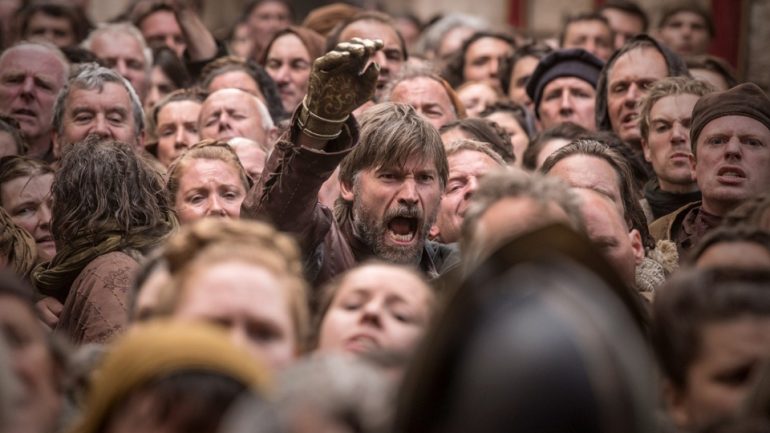
The details and nuances that would help the characters’ choices feel earned are missing, which makes the larger story feel random instead of cohesive.
It makes it seem like Tyrion, who has made one bad (and even treasonous) decision after another, over and over, is allowed to remain as Dany’s Hand of the Queen not because she values him, but because the plot requires him to have access to make certain decisions.
It makes it seem like Varys died for his ideals while Tyrion didn’t, even though they committed the same crime, not because Dany judges them differently but because Tyrion is slotted to have a final reckoning scene in the last episode.
It makes it seem like Euron, who dies dueling Jaime after his entire fleet is wiped out, existed solely as a plot device, with none of his subpots or actions (capturing Yara, defending Casterly Rock, romancing Cersei) ultimately having any real effect on the story aside from his capture of Missandei.
It makes The Hound, whose entire arc has been about redemption vs. revenge, seem like an idiot for charging into his final face-off with The Mountain when Drogon would have destroyed The Mountain anyway. Sure, it underscores the futility of revenge, but at the cost of making The Hound retrospectively feel like a one-note character who — just like Jaime and Dany — can’t seem to escape his own worst impulses.
It makes it seem like Jon, who has never wanted to be a savior, may now have to betray his queen or betray himself — yet another lose-lose proposition that undermines any value in honor.
It makes Daenerys, whose nobility was always questionable to begin with, now seem petty and evil in a way that undermines her evolution and her agency — in the end, despite everything, she’s just another crazy Targaryen after all.
And it makes it seem like Cersei and Jaime didn’t die because they ran out of options due to their own choices; they died simply because the show ran out of time.
We have one more episode to see if Game of Thrones will end in a way that justifies itself narratively, thematically, and emotionally. But in the end, is anything more closely aligned with Game of Thrones than a mixture of shock and disappointment? I, for one, certainly hope so… but maybe “The Bells” was my signal that hope is not something I should hold onto in the face of uncaring power in a hurry.
More Game of Thrones Analysis:
This Lazy Dialogue Habit Is Making Game of Thrones Funny By Accident
How Game of Thrones Uses Scene Structure to Reveal Character and Theme
What Game of Thrones and The Walking Dead Can Teach Us About Modern Storytelling


0 Comments